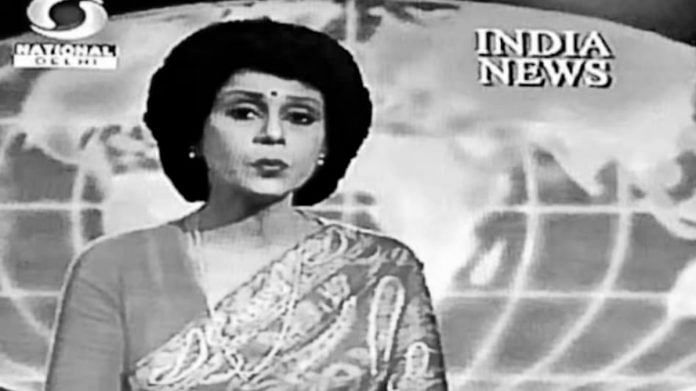New Delhi: Yesteryear journalist Gitanjali Aiyar, who recently died from a prolonged illness, was a patient listener to many a tale of friendship and unrequited love on the popular radio show “Forces Request” that she hosted in the 70s.
“Phenomenon”, was the word used by Sunit Tandon, her co-host in the All India Radio programme for several years — before Aiyar made Doordarshan her home.
With the elegant Aiyar in its corner, “Forces Request” – a programme for officers in the services — only rose from note to note, playing the day’s chartbusters as requested. “Some people would send up to 20 letters just to be featured,” remembered Tandon of the show that was hosted on Delhi B, Medium Wave, 666.66 Hz.
Medium wave had a much wider reach in the evening, and could be “practically heard all over North India”. Letters poured in from officers all over the region with songs for wives, and girlfriends and fellow soldiers posted elsewhere.
“There was a thrill too in doing live programmes, playing the music live, speaking live — they had a wonderful charm,” Tandon said, still amused that he had to handle the equipment all by himself.
The former Director General of the Indian Institute of Mass Communication remembered how the anchors multitasked with the equipment on “Forces Request”. “They were all LP, 45 RPM records, and school tapes. You had to learn how to master those machines and queue the records, because that took a bit of time to pick up speed. So you started the machine while you were still reading out the last three to four seconds of the message and cued it back so that the song began properly when you finished speaking. You had to develop a certain sense of timing to do that,” Tandon said.
And, of course, there was no script. “It was all impromptu,” he added.
Gitanjali Aiyar’s easy appeal was a fluent conduit for officers on duty to send messages to their loved ones. Tandon remembered his colleague Aiyar as “soft spoken, friendly, professional and an epitome of decent behavior”.
“Gitanjali and Phillip Neelam (another co-host) were the seniors in the game,” Tandon said of his time in the programme.
The little transistor, stuffed inside a pocket or tucked under the pillow, carried “Forces Request” to a wide audience, communicating through popular songs the soldiers’ loneliness and hopes, their longing and resolve.
Requests poured in from Ladakh to Kashmir to Manipur, as officers clung to the radio like a lifeline, patiently listening to the messages and hoping their names would be called out.
It was a difficult decision, therefore, to accommodate the multiple requests and the hosts were always careful about not repeating messages, Tandon said, adding, “But some were so funny that we made sure we picked them up every so often.”
Among the more popular songs played were “Summer Wine”, “Seasons in the Sun”, “Raindrops Keep Falling on My Head”, “Knock Three Times”, “Tie a Yellow Ribbon Round the Old Oak Tree”, “I’ll Be There”, “Una Paloma Blanca” and “Top of the World”.
A fan of the show, Group Captain Ashish Kaul remembered “Forces Request” as a lively programme where Aiyar played some “fantastic music”. There were some amazing messages, he said, and one of heartbreak has stuck with him over the years.
A woman called in with a message for a young lieutenant and simply said – “You were the light of my life, but unfortunately I have to get married to someone else.”
Kaul, who joined the armed forces in 1993, recalled how that relationship ended on “Forces Request”, making sad voyeurs of those who listened. “There was a silence for a few moments as she recovered, and then she continued, ‘Best wishes for you, stay happy’,” he said.
In the age of snail mails, “Forces Request” was perhaps the fastest way to convey messages and get a response, he said.
Group Captain Kaul remembered how officers switched on the radio every Monday at 9 pm as eagerly as they waited for the written letter from their loved ones. “Four days a month, 52 times a year… It was the best way to sustain long-distance relationships… And one Vandana Vadehra would get plenty of requests! The programme is still embedded in our minds,” he said.
Aiyar’s eloquence and sensitivity earned “Forces Request” legions of fans, until she was asked to read the news for Doordarshan in 1976. She stayed back in television after Doordarshan split with All India Radio two years later.
Aiyar conquered primetime television next in the days of measured news — and much like “Forces Request” — became a brand, along with colleagues Minu Talwar, Neethi Ravindran and Salma Sultan among others.
Her colleague in the Hindi segment Shammi Narang spoke of her impeccable English, her command over pronunciation, her newsroom decision-making. And of her short-yet-voluminous crop for which she received many letters asking for her hairstylist!
Also read: Camlin – a stationery stalwart that popularised art education in Indian schools



